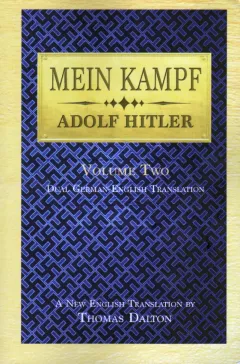Chapter 15, Vol. Two: The Right to Emergency Defense Summary
15.1 Developments in Germany since 1918 prove that the hope of winning the victor's favor by voluntary submission has the most disastous influence on the political views and conduct of the broad masses.
[…]
Seeing that the direction of our post-war historical destiny was now openly controlled by Jews, it's impossible to admit that defective knowledge was the sole cause of our misfortune. Rather, we must conclude that our people were intentionally driven to ruin.
15.2 Seven years after November 1918, the Locarno Treaty was signed. It's purpose was to formalize post WWI borders and to promote reconciliation. [The primary German Signatory was Foreign Minister Gustave Stresemann, whose wife, Kaete Kleefeld, was Jewish.]
Thus in Germany, edicts for disarmament, enslavement, and political and economic plundering followed one after the other.
Finally, they created a mood that caused many to look upon the Dawes Plan as a blessing, and the Locarno Treaty as a success. As incompetent as our leaders were, they were equally conceited!
The less real service provided by the parliamentary statesmen of this Republic (Weimar), the more savagely they persecuted all who expect real achievements!
15.3 By the beginning of 1922-23, it should have been generally recognized that France was still endeavoring to attain it's original war aims.
[...]
The aim was: Disintegration of Germany into a collection of small states.
[…]
For England, the war was really won when Germany was destroyed as a colonial and commercial power, and was reduced to the rank of a second-class state. It wasn't in their interest to wipe out the German State altogether, but they had every reason to want a future rival against France in Europe.
… thus, Clemenceau's statement – that peace was only a continuation of the war – acquired an enhanced significance.
I emphasize, and am firmly convinced, that this second alternative will one day occur, whatever happens. [...]
The French nation is slowly dying out, not so much because of depopulation, as through losing the best racial elements, and it can continue to retain its world position only by shattering Germany.
Only when the Germans have fully understood this, will they stop allowing the national will-to-life to wear itself out in merely passive defense, but will rally together for a final active contest with France.
Today there are 80 million Germans in Europe! Our foreign policy will only be recognized as correct if, after barely a hundred years there will be 250 million Germans living on this continent … as farmers and workers whose labor guarantees each other's existence.
15.4 In Dec 1922 the situation between Germany and France became particularly threatening. […]
With the occupation of the Ruhr District, France hoped that not only would the moral backbone of Germany be finally broken … but that … we'd be forced to submit to every obligation, even the worst.
[…]
What first appeared as a great misfortune was found, upon closer examination, to hold extremely encouraging possibilities for ending Germany's sufferings.
[…]
The largest iron mines and coal fields in Europe were now united in the hands of one nation that, in contrast to Germany, had always defended it's life-interests with determination and action. The French occupation of the Ruhr coal fields had deprived England of all the successes it had gained in the war.
In Italy too, the attitude toward France, which hadn't been very favorable since the end of the war, now became a veritable hatred.
15.5 By occupying the Ruhr, France committed a glaring violation of the Versailles Treaty. This brought it into conflict with several signatory powers, especially England and Italy.
[…]
It was quite clear from the beginning that the fate of this district occupied by the French would one day be decided at some conference table.
15.6 Just as in 1918, when we had to pay with our blood for the failure to crush the Marxist snake once and for all in 1914 and 1915, so we now have to suffer retribution for the fact that, in the spring of 1923, we didn't seize the opportunity to halt the handiwork of the Marxist traitors and murderers of our people.
[…]
And so in the year 1923, brutal action was required to seize the vipers that fattened themselves on the body of the nation. … I often talked myself hoarse in trying to make clear, at least to the so-called national circles, what was then at stake, but I preached to deaf ears.
At that time—I openly admit—I conceived a profound admiration for the great man south of the Alps [Mussolini], whose ardent love for his people inspired him not to bargain with Italy's internal enemies but rather to use all ways and means to destroy them. […]
Since the German government was unable to take such heroic action at that time, it could only have chosen the first way; namely, to do nothing at all and let things take their own course.
15.9 In view of the great common misfortune of our Fatherland, I must abstain from offending and perhaps alienating those who must, at some future date, form one real united front of truly loyal Germans, against the common front of the enemies of our people.
Here at the end of this second volume, let me again bring to mind the memory of those 16 fallen heroes to whom I dedicated the first volume, to remind our supporters and champions of those who, in the clearest consciousness, sacrificed their lives for us all.
And among them, and as one of the best of all, I wish to mention a man who devoted his life to reawakening his—our—people, through his writing, his ideas, and finally his deeds: Dietrich Eckart.
End of Chapter 15 - end of MK, Vol Two.
- Printer-friendly version
- 734 views





